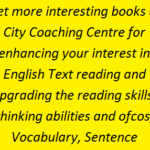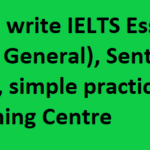When preparing for IELTS, one area that students need to focus on is being able to “use a variety of complex sentences”. One way to practise and obtain this skill is to do sentence transformation exercises.
When we transform a sentence, we change grammatical and lexical form without changing meaning; completing exercises will help you to be better at achieving variety in your writing.
Index
What is Transformation Of sentences
Transformation is changing the form of a sentence without changing its meaning. In the exams transformation should be done according to the direction given in the question paper. In doing transformation a student should have a fairly well knowledge about the kinds of sentence and their formation. A brief direction about doing transformation is given below.
According to the meaning, sentences can be transformed with following rules
Aff – Affirmative (those sentences which are not negative)
Neg – Negative
Ex – example
(A) Affirmative to negative:
Rule 1: Only/ alone/ merely → Replaced by → None but(person)/ nothing but(things)/ not more than or not less than(number)
Ex: Aff: Only Allah can help us. Neg: None but Allah can help us.
Aff: He has only a ball. Neg: He has nothing but a ball.
Aff: He has only ten taka. Neg: He has not more than ten taka.
Rule 2: Must → Replaced by → Cannot but/ Cannot help+ (v+ing).
Ex: Aff: We must obey our parents.
Neg: we cannot but obey our parents/ we cannot help obeying our parents.
Rule 3: Both—-and → Replaced by → not only —- but also.
Ex: Aff: Both Dolon and Dola were excited.
Neg: Not only dolon but also Dola were present.
Rule 4: and ( if join two words) → Replaced by → Not only —– but also.
Ex: aff: He was obedient and gentle.
Neg: He was not only obedient but also gentle.
Rule 5: Everyone/ everybody/every person/ (every + common noun)/all → Replaced by → There is no + attached word + but.
Ex: Aff: Every mother loves her child.
Neg: There is no mother but loves her child.
Rule 6: As soon as → Replaced by → No sooner had —– Than.
Ex: Aff: As soon as the thief saw the police, he ran away.
Neg: No sooner had the thief saw the police he ran away.
Rule 7: Absolute Superlative degree → Replaced by → No other+ attached word+so+ positive form+ as+subject.
Ex: aff: Dhaka is the biggest city in Bangladesh.
Neg: No other city is as big as Dhaka in Bangladesh.
Rule8: Sometimes affirmative sentences are changed into negative by using opposite words. Before the word, off course ‘not’ is used.
Ex: Aff: I shall remember you.
Neg: I shall not forget you.
Rule 9: Always → Replaced by → Never.
Ex: aff: Raven always attends the class.
Neg: Raven never misses the class.
Rule 10: Too —- to → Replaced by → so —that+ can not/could not(in past).
Ex: Aff: He is too weak to walk.
Neg: He is so weak that he cannot walk.
Rule 11: As – as → Replaced by → Not less – than.
Ex: Aff: Simi was as wise as Rimi.
Neg: Simi was not less wise than Rimi.
Rule 12: Universal truth are change by making them negative interrogative.
Ex: Aff: The Sun sets in the west.
Neg: Doesn’t the Sun set in the west.
Rule 13: Sometimes → Replaced by → Not + always.
Ex: Aff: Raven sometimes visits me.
Neg: Raven doesn’t always visit me.
Rule 14: Many → Replaced by → Not a few.
Ex: Aff: I have many friends.
Neg: I donot have few friends.
Rule 15: A few → Replaced by → not many.
Ex: Aff: Bangladesh has a few scholars.
Neg: Bangladesh doesn’t have many scholars.
Rule 16: Much → Replaced by → A little.
Ex: Aff: He belongs much money.
Neg: He doesn’t belong a little money.
Rule 17: A little → Replaced by → not much.
Ex: Aff: Dolon has a little riches.
Neg: Dolon doesn’t have much riches.
(B) ASSERTIVE TO INTERROGATIVE
Rule 1: If the sentence is in the affirmative you have to change it into negative interrogative. If it is in negative then you have to change it into bare interrogative.
Ex: Ass: He was very gentle.
Int: was n’t he very gentle?
Aff: He is not a good person.
Int: Is he a good person?
Rule 2: No auxiliary verb in sentence →→ Change it by using →→ Do/does/did Or Don’t/doesn’t/didn’t.
Ex: Ass:He plays Football.
Int: Does he play football?
Ass: They did not play football yesterday.
Int: Did they play football yesterday?
Rule3: Never → Replaced by → Ever.
Ass: I never drink tea.
Int: Do I ever drink tea?
Rule 4: Every body/everyone/ All → Replaced by → Who + Don’t/ Doesn’t/ Didn’t
Ex: Everybody wishes to be happy.
Int : Who doesn’t wish to be happy?
Rule 5: Every + noun → Replaced by → Is there any + noun+ Who don’t/doesn’t/didn’t.
Ex: Ass: Every man wishes to be happy.
Int: Is there any man who doesn’t wish to be happy?
Rule 6: No body/ no one / None → Replaced by → Who.
Ex: Nobody could count my love for you.
Int: Who could ever count my love for you?
Rule 7 : There is no → Replaced by → Is there any/ Who(person)/ What( thing).
Ex: Ass: There is no use of this law.
Int: What is the use of this law.
Ass: There is no man happier than Jamil.
Int: Who is Happier than jamil.
Rule 8: It Is no → Replaced by → Is there any/Why.
Ex: Ass: It is no use of taking unfair means in the exam.
Int: Why take unfair means in the exam? Or, Is there any use of this law?
Rule 9: It Doesn’t matter → Replaced by → what though/ Does it matter.
Ex: Ass: It does not matter if you fail in te exam.
Int: What though if you fail in the exam?
(C) Interrogative to assertive is to be done doing Vice versa.
(D) Exclamatory sentence to Assertive sentence
Rule1: Subject and Verb of exclamatory sentence are to be used as the subject and verb of assertive sentence at the outset of the sentence.
How/what → Replace by → Very(before adjective)/ Great(before noun)
Ex: How fortunate you are!
Ass: You are very fortunate.
Exc: What a fool you are!
Ass: You are a great fool.
Rule 2: Sometimes the subject and verb may be eclipsed.
Ex: What a beautiful scenery!
Ass: It is a very beautiful scenery.
Ex: What a pity!
Ass: It is a great pity.
Rule 3: Hurrah/ Bravo → Replace by → I/we rejoice that/ It is a matter of joy that.
Ex: Hurrah! We have own the game.
Ass: It is a matter of joy that we have won the game.
Rule 4: Alas → Replace by → I/we Mourn that/ It is a matter of sorrow or grief that.
Ex: Alas! He has failed.
Ass: We mourn that he has failed.
Rule 5: Had/were/If /Would that(at the out set) → Replaced by → I wish + subject again + were/ had+ rest part.
Ex: Had I the wings of a bird!
Ass: I wish I had the wings of a bird.
Ex: Were I a bird!
Ass: I wish I were a bird.
Ex: If I were young again!
Ass: I wish I were young again.
Ex: would that I could be a child!
Ass: I wish I could be a child.
(E) Assertive to exclamatory is to be done doing Vice versa.
(F) Imperative to assertive
Rule 1: Add subject + should in doing assertive.
Ex: Do the work.
Ass: you should do the work.
Rule 2: Please/kindly → Replaced by → you are requested to.
Ex: Please, help me.
Ass: You are requested to help me.
Rule 3: Do not → Replaced by → You should not.
Ex: Do not run in the sun.
Ass: you should not run in the sun.
Rule 4: Never → Replaced by → you should never.
Ex: Never tell a lie.
Ass: You should never tell a lie.
Rule 5: Let us → Replaced by → We should.
Ex: Let us go out for a walk.
Ass: We should go out for a walk.
Rule 6: Let + noun/pronoun → Replaced by → Subject + might.
Ex: Let him play football.
Ass: He might play football.
Change of degree
Rule1: If the superlative degree says about the best thing then the rule is:-
For comparative,use –
subject +verb + adjective/adverb(comp. form) + Than any other + rest part
For positive, use-
No other + rest part after supr. Degree + verb + so/as + positive form of adj/adv + as + sub.
Ex: Su: Suman is the tallest boy in the class.
Com: Suman is taller than any other boy in the class.
Pos: No other boy in the class is as tall as Suman.
Rule 2: If In superlative degree ‘One of the’ is transformed in this way:
Comparative: Sub+verb +comp. form +than most other+ Rest part.
Positive: Very few+ rest part after supr. Degree + verb + so/as + positive form of adj/adv + as + sub.
Ex: Nazrul was one of the greatest poets in Bangladesh.
Comp.: Nazrul was greater than most other poets in Bangladesh.
Positive: Very few poets in Bangladesh were so great as Nazrul.
Note: Superlative: Of all/ of any
Comparative: Than all other/than any other.
Positive: It does not exist.
Ex: Sup: Mr. khan is the oldest of all men in the village.
Com: Mr. Khan is older than all other men in the village.
Pos: No other man is as old as Mr. Khan.
Rule 3: Simple comparative is transformed into positive by using
(not so + adj/adv+as)/ (so+adj/adv+as)if negative. Second noun or pronoun is used first.
Ex: 1. com: Rina is wiser than Mina.
Pos: Mina is not so wise as Rina.
2. Com: Mina is not wiser than Rina.’
Pos: Rina is as wise as Mina.
Rule 4: No/not less — than is transformed into positive by using as +adj/adv+ as
Ex: com: Karim is not less meritorious than Suman.
Pos: Karim is so meritorious as Suman.
Complex →→→ Simple →→→ compound
Rule 1:Since/As/When Change is to be made in the subordinate clause .
When subjects are same.
Simple: 1) Omit since/as/when.
2) (Verb+ing) of the subordinate clause.
3) then write the rest part.
4) use subject with the principal clause.
5) Principal clause remains unchanged.
Ex: Since the boy worked hard, he made a good result.
Simple: Working hard, the boy made a good result.
Compound: 1) Omit since /as /when
2) write down the rest part.
3) join clauses by using and, and so, and therefore
4) write the main clause unchanged.
Ex: The boy worked hard and made a good result.
Rule2: In case of Be verb in subordinate clause:
1) Use being/ Because of + Pronoun/noun(possessive form)+ being.
Ex: Since he was weak, he could not work hard.
Simple: Because of his being weak, he could not work hard.
Compound: He was weak and therefore could not work hard.
Note: and therefore, is used for showing reasons.
Rule3: When the subject of clauses are different:
Simple:
1)Subject of s.c.
2) Verb+ing ( be verb → being; Have verb → having)
Ex: Since the weather was foul, we did not go out.
Sim: The weather being foul, we did not go out.
Compound: use ‘and therefore’to join two clauses.
Ex: The weather was foul and therefore we did not go out.
Rule 4: If,’ is Replaced by – ‘by + (verb+ing)
Ex: If you work hard, you will succeed in life.
Simple: By working hard, you will succeed in life.
Compound: 1) Omit if+subject.
2. use ‘and’ to join two clauses.
Ex: Compound: Work hard and you will succeed in life.
Rule 5: Simple: If-not/unless, is replaced by, – without+( verb+ing)
Ex: Complex: If you donot work hard, you will fail in the examination.
Sim: Without working hard, you will fail in the examination.
Compound: Use or’/otherwise to join two clauses.
Ex: Work hard or you will fail in the examination.
Rule 6: Simple: Though’ is replaced by In spite of+ Possessive form of the subject+ (verb+ing)
Ex: Com: Though he tried heart and soul, he could not succeed in life.
Sim: In spite of his trying heart and soul he could not succeed in life.
Compound: Use ‘but’ to join two clauses.
Rule 7: Simple: So that is replaced by to/in order to.
Ex: Comp: He works hard so that he may prosper in life.
Sim: he works hard to/in order to prosper in life.
Compound: “and want/wants to” is used to join two clauses.
Ex: He works hard and wants to prosper in life.
Rule 8: Simple: ‘so + adjective + that’ is replaced by ‘Too + adjective + to’
Ex: The boy is so foolish that he cannot understand it.
Sim: The boy is too foolish to understand it.
Compound: Use ‘And Therefore’ to make it a compound sentence.
Ex: He is so foolish and therefore cannot understand it.
Rule 9: When (if mentions time) is replaced by
For short time – At
For month or Season – In
For age— at the age of.
Ex: She woke up when it was midnight.
Simple: She woke up at midnight.
Com: When it is spring, the cuckoo sings.
Sim: In Spring the cuckoo sings.
Con: When Samira was four she went to school.
Sim: At the age of four, Samira went to school.
Compound: Use and to join clauses.
Ex: She woke up and it was midnight.
Rule 10: Simple: If the clause says a bout a continuous fact then use-
At the time of instead of ‘When’
Ex: When I was eating the phone rang.
Sim: At the time of my eating, the phone rang.
Compound: Use ‘And’.
Ex: I was eating and the phone rang.
Rule 11: Simple: Noun clause can be replaced by noun.
Ex: Com: He admitted that he was guilty.
Sim: He admitted his guilt.
Com: That he is honest is known to all.
Sim: his honesty is known to all.
Compound: Use ‘And’.
Ex: He is honest and it is known to all.
Rule 12: Simple: If Complex sentence is made with relative pronoun(who, what, which, that), omit it and make (verb+ing).
Com: The Doctor who is working in the hospital is known to all.
Sim: The doctor working in the hospital is known to all.
Note: If the verb is in the past participle it remains unchanged.
Ex: The picture which was drawn by Liza is very fine.
Sim: The picture drawn by Liza is very fine.
Rule 13: Simple: Adjective Clause is changed into – Adjective, Past participle Phrase, Noun in apposition, infinitive.
Adjective:
ex: A man who is drowning catches at a straw.
Sim: A drowning man catches at a straw.
Compound: A man is drowning and so catches at a straw.
Past participle phrase:
Ex: The answer that he wrote was not correct.
Sim: The answer written by him was not correct.
Compound: He wrote the answer and it was not correct.
Gerundial Infinitive:
Ex: I have no money that I can lend you.
Sim: I have no money to lend you.
Compound: I have no money and I cannot lend you.
Rule 14: In the compound “ not only—- But also” is Changed by “Besides + (Verb +ing)”
In the simple.
Ex: Mr.Khan not only teaches us English but also writes novels.
Sim: Besides teaching us English, Mr. Khan Writes novels.
Too…to and so…that
We have seen that the form of a sentence can be changed without changing its meaning. The transformation can be done using several different methods.
For example a simple sentence containing the adverb too can be transformed into a complex sentence containing so…that with no difference in meaning.
Study the following sentences.
The news is too good to be true.
The news is so good that it cannot be true.
The thief ran too fast for the police to catch.
The thief ran so fast that the police could not catch him.
He is too proud to beg.
He is so proud that he will not beg.
The tea was too hot to drink.
The tea was so hot that I could not drink it. OR The tea was so hot that it could not be drunk.
The bag was too heavy for me to lift.
The bag was so heavy that I could not lift it.
He spoke too fast to be understood.
He spoke so fast that he could not be understood.
Notes
If the adverb too is followed by an adjective + to infinitive, we expand the sentence into two clauses, the first containing so and the second containing that. If the sentence containing too…to is in the affirmative, the sentence containing so…that will be in the negative.
Test
Fill the blank with one word IELTS part 1 sentences so that the second sentence is expressed in a different way, but the meaning is the same.
1. By the end of the decade, pollution levels were stable.
The end of the decade saw ________ in levels of pollution.
2. The price of theatre tickets reached a peak in 2004.
There was a ________ in the price of theatre tickets in 2004.
3. A slight drop in student school attendance in 2012 was linked to many cases of food poisoning.
In 2012, food poisoning amongst many students led to school attendance slightly ________.
4. France will spend much less on health than Spain over the next 10 years.
________ on health in Spain will be much higher than in France over the next 10 years.
5. The aging population in Japan has grown steadily.
There has been steady ________ in the aging population in Japan.
6. First, a conveyor belt carries the vegetables to the cleaning baths.
First, the vegetables are ________ to the cleaning baths by conveyor belt.
7. Crime patterns among Northern European countries have differed significantly since 2002.
There have been ________ differences in crime patterns among Northern European countries since 2002.
8. The price of imported goods is predicted to rise marginally.
There is predicted to be a ________ rise in the price of imported goods.
9. The management will be making a number of important changes to the company structure.
The company structure will have important changes ________ to it by the management.
Answer Key
- The end of the decade saw stability in levels of pollution.
- There was a peak in the price of theatre tickets in 2004.
- In 2012, food poisoning amongst many students led to school attendance slightly dropping.
- Spending on health in Spain will be much higher than in France over the next 10 years.
- There has been steady growth in the aging population in Japan.
- First, the vegetables are carried to the cleaning baths by conveyor belt.
- There have been significant differences in crime patterns among Northern European countries since 2002.
- There is predicted to be a marginal rise in the price of imported goods.
- The company structure will have important changes made to it by the management.
- Preference Sentences
 Find a number of examples of Preference sentences and clear your understanding how to use correctly rather, prefer, would prefer, would rather….
Find a number of examples of Preference sentences and clear your understanding how to use correctly rather, prefer, would prefer, would rather…. - Rather / Rather than / Instead of
 Check here a number of example sentences to know how to use Rather, Rather than, Instead of correctly. This will help you in avoiding errors in IELTS writing.
Check here a number of example sentences to know how to use Rather, Rather than, Instead of correctly. This will help you in avoiding errors in IELTS writing. - Check your grammar level in English
 This is approximately your current level of English and you should make a plan to further improve your English.For example, if you are at Pre-intermediate level currently, you should make plan to achieve Intermediate level.
This is approximately your current level of English and you should make a plan to further improve your English.For example, if you are at Pre-intermediate level currently, you should make plan to achieve Intermediate level. - Sentences with PUT
 Check herein list of English sentences with PUT.Punjabi translation is also given.
Check herein list of English sentences with PUT.Punjabi translation is also given. - Sentences with “SO”
 Find here a list of sentences with SO.Punjabi translation is also given for easy understanding of accurate use of word “So”
Find here a list of sentences with SO.Punjabi translation is also given for easy understanding of accurate use of word “So” - Difference between “So” and “So That”
 Know the difference between so and so that.As a conjunction, ‘so’ is used to show the effect or result.As a conjunction ‘so that’ is used to talk about purpose
Know the difference between so and so that.As a conjunction, ‘so’ is used to show the effect or result.As a conjunction ‘so that’ is used to talk about purpose - Sentences with BECAUSE
 Learn through example sentences how to use BECAUSE accurately.English sentences with Punjabi translation are given for easy understanding.
Learn through example sentences how to use BECAUSE accurately.English sentences with Punjabi translation are given for easy understanding. - Sentences with TAKE
 Learn through example sentences how to use TAKE accurately.English sentences with Punjabi translation are given for easy understanding.
Learn through example sentences how to use TAKE accurately.English sentences with Punjabi translation are given for easy understanding. - Sentences with MAKE
 Learn through example sentences how to use MAKE accurately.English sentences with Punjabi translation are given for easy understanding.
Learn through example sentences how to use MAKE accurately.English sentences with Punjabi translation are given for easy understanding. - Phrasal Verbs List
 Phrasal verbs are usually two-word phrases consisting of verb + adverb or verb + preposition. Think of them as any other English vocabulary. Study them as you come across them, rather than trying to memorize many at once. Check here most common phrasal verbs with meaning and examples.
Phrasal verbs are usually two-word phrases consisting of verb + adverb or verb + preposition. Think of them as any other English vocabulary. Study them as you come across them, rather than trying to memorize many at once. Check here most common phrasal verbs with meaning and examples. - What is a Verb
 Verbs are words that show an action (sing), occurrence (develop), or state of being (exist). Almost every sentence requires a verb. The basic form of a verb is known as its infinitive. The forms call, love, break, and go are all infinitives.
Verbs are words that show an action (sing), occurrence (develop), or state of being (exist). Almost every sentence requires a verb. The basic form of a verb is known as its infinitive. The forms call, love, break, and go are all infinitives. - Types of a Sentence
 A sentence is a set of words that is complete in itself, typically containing a subject and predicate, conveying a statement, question, exclamation, or command, and consisting of a main clause and sometimes one or more subordinate clauses. (Source: Oxford Dictionary)
A sentence is a set of words that is complete in itself, typically containing a subject and predicate, conveying a statement, question, exclamation, or command, and consisting of a main clause and sometimes one or more subordinate clauses. (Source: Oxford Dictionary)
